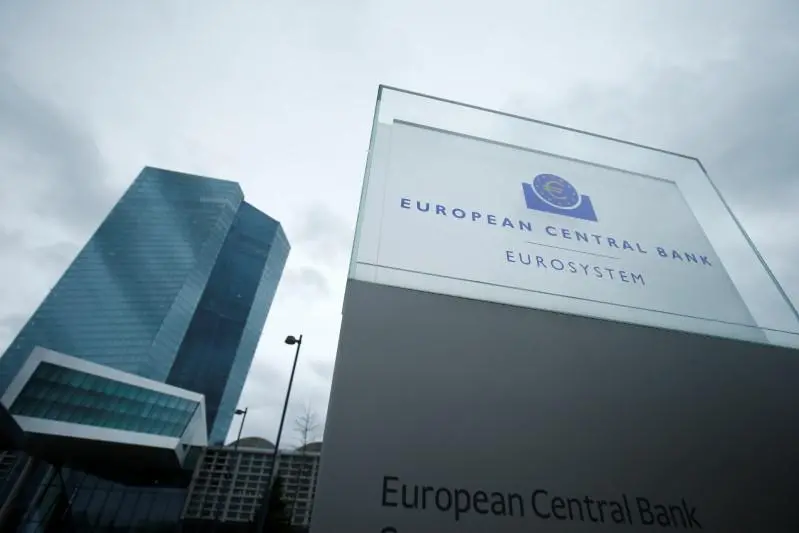PHOTO
Strong investor inflows into bond markets this year mean traders and bankers are confident the European Central Bank will have a smooth start to unwinding its huge bond holdings, but the long term impact of its "quantitative tightening" is a big unknown.
The ECB has amassed a 5 trillion-euro ($5.31 trillion) portfolio after nearly a decade of quantitative easing (QE) that saw it buy bonds to fight deflationary risks in the euro zone in the aftermath of the euro zone debt crisis.
Now fighting high inflation, the ECB will this month start running the bonds off its balance sheet at a rate of 15 billion euros per month on average through June.
QT is the next step following 300 basis points of rate increases and a halt to new bond buying since last year.
So far traders are optimistic, comforted by an initially small pace of bond sales and a predictable structure. The main focus has been on rate rises, which have become the ECB's primary policy tool.
"The market got used to less of a presence or not expecting the presence of the ECB," said BNP Paribas's head of investment grade finance Giulio Baratta. "Markets have improved between Q4 and Q1 significantly and independently from ECB participation."
Euro area government bond yields have hit multi-year highs given expectations for more rate increases.
The higher yields are enticing investors back in. Bond funds have attracted eight straight weeks of inflows, BofA said citing EPFR data, the longest streak since November 2021.
'TOTALLY UNCLEAR'
Caution is nevertheless warranted.
QE was a new experiment that drove cash into risk assets globally. Therefore, QT and how it impacts markets is also a big unknown.
U.S. and UK central banks have started QT, although the Bank of England was forced to delay its plans following turmoil in British bond markets last year.
The ECB is launching QT by not fully reinvesting proceeds from maturing debt bought under its Asset Purchase Programme (APP) launched in 2015.
It will make remaining reinvestments in proportion to upcoming bonds maturing by each country and across public versus private sector debt.
The pace of the ECB's QT is unclear after June. A December Reuters poll had expected the ECB to reduce its APP stock by 175 billion euros in 2023.
Dutch central bank chief Klaas Knot, a policy hawk, has said that should QT continue to have a limited impact, the ECB could up the pace to 26 billion euros a month, halting APP reinvestments.
"The size of (ECB) programmes was always clear to you. And now the size might be totally unclear. So you don't know: will they buy, how much will they buy? How long will they buy?" said DZ Bank's head of government bond trading Dalibor Jarnevic.
If APP reinvestments stop before the end of 2024, ECB market presence would rely on reinvestments under the more flexible Pandemic Emergency Purchase Programme (PEPP).
The ECB has leeway on where to divert those reinvestments, so if it needed to invest heavily in certain countries to calm markets, others could be left with much less support. Data on those reinvestments is also published less frequently.
"This will make it totally different, there's a kind of liquidity but you don't know where it can be steered and so it's a really flexible instrument," DZ Bank's Jarnevic said.
Some sources with knowledge of ECB discussions say that policymakers want QT to merely run in the background, rather than follow an aggressive schedule or timeline.
Still, the future of QT creates uncertainty for a market which has repeatedly repriced how far rates will rise and is facing geopolitical risks.
"There are still risks out there. And we'll see more QT as potentially adding to a problem if there is one," said Pierre Blandin, global head of sovereign, supranational and agency debt capital markets at Credit Agricole CIB.
OPPORTUNITIES
Borrowers are already raising funds fast when they can. They raced to the debt markets at a record pace in January and are taking advantage of good demand to sell longer-dated debt, a harder sell when a guaranteed buyer steps back.
"For issuers who need duration, it's extremely tempting to tell them right now you've got depth at the longer end of the curve, and you should take advantage of it," Credit Agricole's Blandin said.
Whatever the size or pace, traders are seeking opportunities as the ECB makes the shift to QT.
Julian Baker, co-head of euro rates trading at JPMorgan, said QT meant trading desks would depend more heavily on traditional investors to trade bonds.
"That means we have to go back to old school bond trading, leverage the franchise, and be really close to the investor base, because the market participation of these investors has been significantly impacted by the QE programme for a long period of time, and now they're coming back," he said.
"As a trader, it's exciting."
($1 = 0.9422 euros)
(Reporting by Yoruk Bahceli, additional reporting by Balazs Koranyi; editing by Dhara Ranasinghe and Jane Merriman)





















